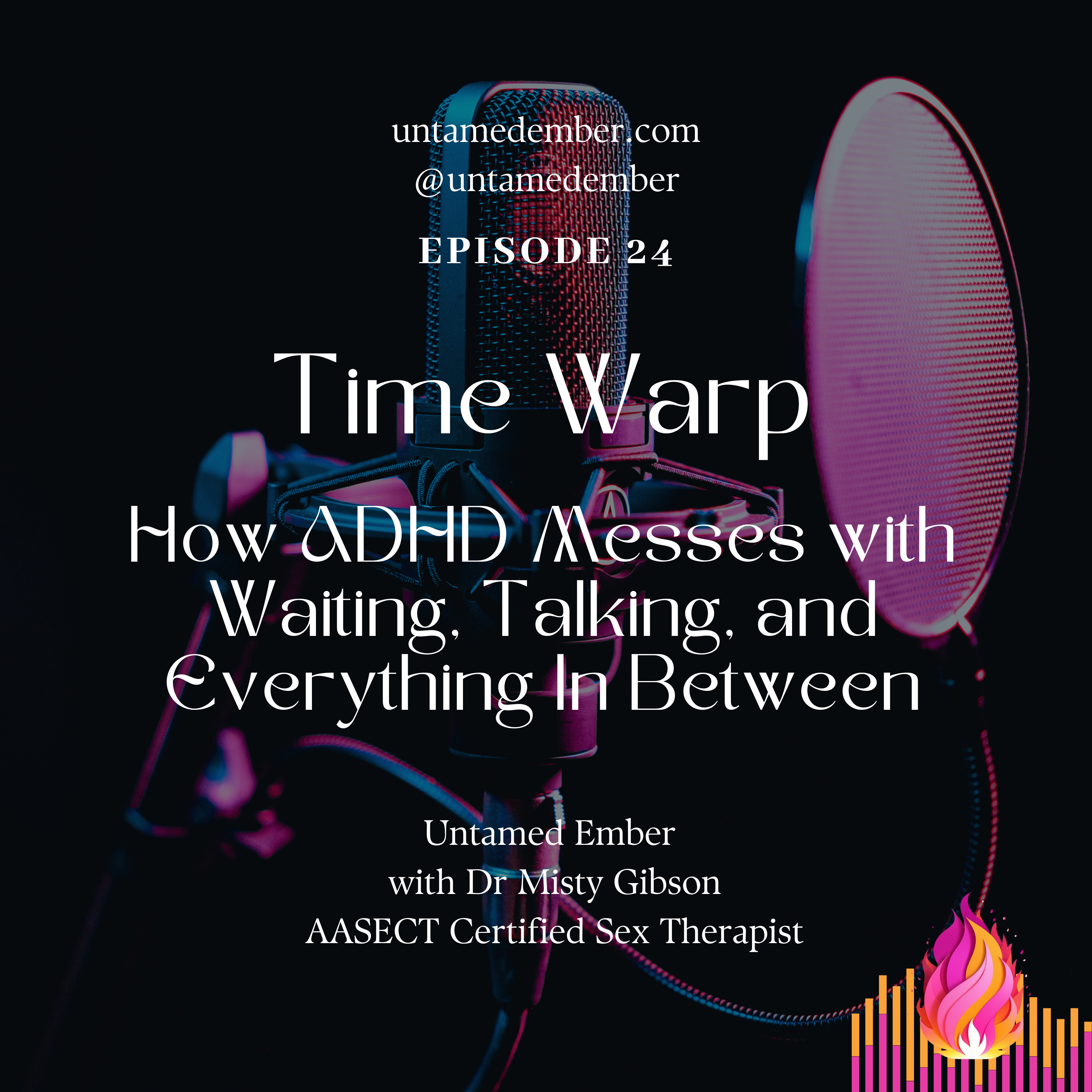[00:00:00] Have you ever found yourself waiting for someone to answer a question? And about three seconds in, your brain starts staging a dramatic reenactment? You know that feeling when silence feels like it stretches on forever, even though objectively it's only been a few seconds? Or maybe you've been on the other side. Someone asks you something and you need an extra beat to process. But before you can even open your mouth, they're already jumping in again, filling the space.
[00:00:26] If any of this feels painfully familiar, congratulations. You're not alone. And you're not broken. Today we're diving in headfirst into the wild world of neurodivergent time perception. Why some of us experience time like a bad trip through a funhouse mirror, and what it means for our conversations, relationships and daily lives. Welcome back to Untamed Ember, where we torch shame, normalize weird brains, and generally refuse to perform normalcy for the sake of polite society. I'm Dr. Misty and this week we're unpacking why waiting feels like agony, why conversation gaps can trigger existential dread, and how ADHD and other neurodivergent brains experience the flow of time completely differently from the so called nor. And before you try to self soothe with a productivity hack, don't. This isn't about being impatient or needing to meditate more, or any of that ableist nonsense.
[00:01:24] This is about how our brains are actually wired. So let's get nerdy. Let's dig into what's really going on inside your brain when it comes to time. Because the ADHD time warp, it isn't just a cute meme, it's a neurobiological fact. And it has some wild consequences for how we move through the world.
[00:01:45] For most neurotypical folks, time is kind of like a well marked hiking trail. There are signposts, past, present and future, and a pretty predictable path from one moment to the next. But for ADHD and a lot of other neurodivergent brains, time is less like a trail and more like a swirling river with no banks, no mile markers, and sometimes no sense of direction at all.
[00:02:11] You're either in the river or you're not. And the river is always now. That's what's often called time blindness.
[00:02:20] It sounds kind of poetic, maybe even fun, if you don't have to pay bills or show up to meetings on time.
[00:02:26] But what it really means is that your brain doesn't create strong internal cues for how much time is passing. Five minutes, five hours, five days. They can blur together, especially if you're hyper. Focused or totally bored. Why? Well, here's where the neuroscience gets juicy. The part of your brain that's responsible for keeping track of time, your prefrontal cortex, depends heavily on the neurotransmitter dopamine to function well.
[00:02:54] And ADHD brains, as you might know, tend to have dopamine that's, let's say, unreliable. Like a bus that might show up at any moment or might get stuck in traffic for an hour.
[00:03:07] When dopamine's not flowing smoothly, your brain loses its ability to track time accurately, to plan ahead, or even to feel the urgency that comes with deadlines. And that's just the start. Time perception isn't just about clocks. It's about how you experience your life. Some researchers break it down like neurotypical brains tend to operate with a future oriented sense of time. They can imagine what needs to be done in an hour or tomorrow or next week and use that sense of future self to motivate action.
[00:03:40] ADHD and some autistic folks.
[00:03:43] Our brains tend to live almost exclusively in the present. There's now and not now. And everything in not now has a way of vanishing into the mist until it suddenly becomes urgent now. Which is why we're experts at last minute panics and adrenaline fueled all nighters. You might notice this most in the little things. Maybe you start a task and suddenly it's dark outside and you forgot to eat. Or maybe you get lost in doom scrolling or a favorite hobby and the hours just slip away. On the flip side, when you're bored or doing something tedious, say waiting in line or listening to a slow lecture, every minute stretches out like a bad dentist appointment.
[00:04:28] This isn't about willpower, it's literally how your brain is wired. And when it comes to relationships or conversations, this time warp gets even more obvious.
[00:04:38] You might fire off a text and expect a reply instantly, because for your brain, it feels like you're still in the middle of that moment. But for the other person, hours or days might pass before they get back to you and it feels like an eternity. Or you might be the one who takes longer to respond. Not because you don't care, but because that conversation dropped out of now and into the abyss of not now.
[00:05:03] It's not just an ADHD thing either. Autistic folks and other neurodivergent people can experience time differently. Sometimes through hyper focus, sometimes through shutdowns or sensory overwhelm where time loses all meaning. Trauma too can mess with your sense of time. When your body is in survival mode, your brain either speeds everything up or slows it all down to cope. And here's the thing. All. All of this is adaptive. Your brain is doing its best to protect you, to help you survive, to grab whatever dopamine it can and ride it into the sunset. But the end result is that time becomes slippery. Hard to hold, hard to trust. So if you've ever wondered, why can't I just wait like everyone else? Or why does a pause feel like forever? This is why. It's not laziness or impatience or. Or a lack of maturity. It's your neurobiology doing exactly what it was designed to do. Even if it makes daily life feel like a Doctor who episode. Directed by David Lynch. What's wild is that once you know this, you can start to play with it. You can notice when the river of now is sweeping you away, and maybe, just maybe, build some little bridges, rituals or reminders to help you orient in time instead of always fighting the current. So let's get painfully honest about how these time warps actually show up in the real world. Because even if you know the neuroscience, that doesn't make it suck less when you're in the middle of it. Especially with people you care about. For a lot of us, this starts with conversation. Imagine you're with someone. A partner, a friend, a co worker, a date. You ask a question, and the response doesn't come right away. Suddenly, your brain is off to the races.
[00:06:52] In those few seconds of silence, a million anxious thoughts explode. Did I say something wrong? Are they judging me? Should I fill the space? Your body might even tense up, your heart's racing skin prickling, that awful tightness in your stomach that says something is wrong. Meanwhile, on the other side of the table, the other person might just be thinking or processing or waiting for their turn. Especially if they're a slow processor or. Or if they grew up in a culture where pausing before you speak is respectful for fast processing brains. Those pauses can feel like torture. You might find yourself blurting out another question, rewording what you just said, or even more common, jumping in with your own answer before they've even had a chance to speak.
[00:07:38] And if you're on the slow processing side, the pressure ramps up. You might feel like you can never quite catch up, or. Or like you're always being interrupted or dismissed before you can get your words together.
[00:07:50] And let's be real, this doesn't just cause awkwardness. It can cause real pain.
[00:07:55] There are so many stories of neurodivergent folks, especially those with ADHD or who process quickly being called rude, overbearing or self centered simply because the pace of their brain doesn't line up with the room. On the flip side, slow processors get labeled disengaged, a uninterested or even stupid when really they're just marinating on what was said. This misalignment can show up everywhere. Texting. Why haven't they answered? Meetings, family dinners, therapy sessions, group chats. Even sex. Yes, even sex. Because, let's be honest, timing and pacing are everything when you're trying to navigate desire, consent and pleasure in real bodies, not just in theory.
[00:08:40] Here's where the shame spiral creeps in. When your sense of time is so different from those around you, you start to question yourself. Am I too much? Not enough? Why can't I just be normal? And maybe, like a lot of us, you start to mask. You try to slow yourself down, wait longer than what feels natural, or pretend you're not as impatient or intense as you actually are.
[00:09:03] Or you give up on being heard.
[00:09:05] Or you give up on being heard and just check out of conversations altogether. Relationships take the biggest hit. Think about couples. One person who needs to talk things through quickly, the other who needs a day or a week to process before responding. How many fights are really just mismatched timelines? How much resentment, misunderstanding and loneliness is actually about different brains measuring enough time in wildly different ways.
[00:09:33] I see this in client work all the time. Partners who love each other but keep missing each other in the gap between ask and answer. The person who wants to resolve conflict now gets labeled as demanding or high maintenance, while the one who needs time is told they're avoidant, cold, or even passive aggressive. Friendships feel it too. Maybe you're the one always texting first, feeling like you're pestering everyone, or waiting hours, sometimes days, for a reply.
[00:10:00] And every minute feels like proof that you care more. And every minute feels like proof that you care more. Or maybe you're the friend who feels dread at every notification, not because you don't want to respond, but because you need more time to form your thoughts and by the time you're ready, the conversation's already moved on. And then there's work, the land of ASAP slack messages, and urgent emails that demand immediate answers. Or the endless meetings where everyone is expected to process and contribute at the same speed, as if that's just a personality trait and not a neurobiological function. Fast processors get accused of dominating the conversation, while slow processors risk being left out of decision making or worse, assumed to be checked out or not leadership material.
[00:10:49] Spoiler. It's not about skill or ambition. It's about whose timeline the workplace values.
[00:10:55] All of this adds up to a feeling of never quite fitting, of always being off.
[00:11:01] And when unaddressed, it can breed distance, resentment, and chronic misattunement in our closest relationships.
[00:11:09] Sometimes that shame can become self criticism. Why can't I just be patient? Why can't I keep up?
[00:11:16] And sometimes it turns into blaming others for not meeting you where you are. Here's the radical none of this is a moral failing. It's not about caring too much or too little. And it sure as hell isn't about being broken. It's about having a brain and a nervous system that run on a different clock. And that clock? It's not wrong. It's just real.
[00:11:37] So when you find yourself in a conversation time warp, waiting, fidgeting, filling the silence, or wishing everyone else would just speed up or slow down, remember this isn't personal.
[00:11:49] It's neurological. It's relational, and it's totally, beautifully human.
[00:11:54] Okay, so you know your brain does time differently and you're not here to fix it because there's nothing wrong with you. But let's be honest, the world runs on neurotypical time. So how do we, as neurodivergent rebels survive and actually thrive when our sense of waiting, urgency, and conversational flow doesn't match the culture around us? First, let's torch the idea that you just need to be more patient. Try harder to listen and or think before you speak. Those might be useful mantras for people whose brains naturally run on standard issue time. But for adhd, autistic, or otherwise fast or slow processing folks, they're not just unhelpful, they're shame triggers. So here's what actually works for fast processors, if waiting feels like nails on a chalkboard, your nervous system isn't failing, it's responding exactly as it was designed. See? Seeking stimulation, avoiding boredom, and hyper focusing on the gap between question and response. To work with your brain, not against it. Try reality calibration next time you're waiting for an answer, especially in conversation. Start a timer. As soon as you ask your question, notice how long it feels before you get a reply. Then check the actual time spoiler. It's usually way less than your body is telling you.
[00:13:13] Do this a few times and you'll start to notice just how wildly subjective time really is.
[00:13:18] Or try this pre game the wait.
[00:13:21] If you know you're about to enter a situation where waiting or silence is likely, come prepared. Bring a fidget, something sensory, a soft stone, a stim toy, even a pen to click or set yourself up with a tiny, doable distraction, a doodle, A list, A breath.
[00:13:40] Sometimes giving your body something else to process can take the edge off the impatience.
[00:13:45] Developing your own mantra for these awkward moments, like they're not ignoring me, they're processing. Or this pause isn't rejection, it's just their speed. It sounds cheesy, but reframing silence as a normal, healthy part of dialogue can lower that shame and anxiety spiral. Try communicating your tempo. Try saying, if you need time to think, just let me know. I get impatient otherwise. Or I know I process fast, so take all the time you need and I'll try to chill over here. Humor helps. It turns a source of stress into a running gag, which builds connection instead of tension for slow processors. If your brain needs time to marinate, rehearse or settle before you answer, own it.
[00:14:31] You're not being difficult. You're being thorough and thoughtful. Here's how to make that work for you and your relationships. First, claim your time. Give yourself radical permission to say, I need a second to think about that, or I'll circle back when I've had a chance to process.
[00:14:47] Practice this with yourself first. If it feels scary, your nervous system gets to have its own pace. Even in a culture that rewards speed.
[00:14:56] Try visual and verbal cues.
[00:14:58] Sometimes a simple hand signal, thumbs up, raised finger, even a sticky note that says Thinking can let others know you're not checked out. Just working at your own pace for text or email, a quick received processing will reply soon can relieve pressure on both sides. Preemptive scripts tell the people closest to you, I'm a slow cooker, not a microwave.
[00:15:23] My best thoughts come with a little simmering time.
[00:15:26] Normalize needing pauses in your relationships, and your people will start to see it as a strength and not a problem.
[00:15:33] Build in buffers if you know you'll be put on the spot in work meetings, social gatherings, or tough conversations. Request agendas in advance or time to process before making decisions. Can I sleep on? That is a perfectly legitimate boundary. The magic happens when you stop trying to make everyone fit one tempo and start treating the time warp as a relational difference. To navigate together in relationships, you can try meta conversations. Talk openly outside of the heat of the moment about how you each experience waiting. Pausing, and responding. Make it part of your relational script. I notice I get jumpy if you don't reply right away. How do you feel about silence?
[00:16:14] What does waiting feel like to you? Remember compassion over compliance Try to remind yourself that both speeds are valid. You're not teaching someone to be better. You're building new rituals of understanding. Celebrate the small wins the moment you waited 10 seconds longer or the time your partner said I need to go slow and you both survived. Use humor and signals. Have a shared code word or an emoji for processing or for fast brain incoming. Turn the difference into an inside joke, not a source. Experiment and then debrief. Try out different timing strategies and check in after did that pause help or make things worse? Did you feel rushed? Keep it collaborative and low stakes. The goal isn't to fix, but to co create something that feels fair for tough conversations or big decisions. Build in sacred pauses. Maybe you both agree to wait 24 hours before responding to anything high stakes. Or you take five breaths before replying to a hard question.
[00:17:17] Let pauses be part of your intimacy, not just obstacles. Let's be clear. It's okay to struggle. It's okay to get impatient, and it's okay to need more time. The point isn't to become someone else. It's to get more honest about what's real for you. And if that means asking for help, changing how you communicate, or even stepping out of a conversation to regulate, do it. There's nothing wrong with you for needing what you need if you're listening to this thinking, but my partner just doesn't get it. Send them this episode. Start the conversation here, because when we make time perception difference visible, we start to heal the shame and disconnection that come from years of being told that our brains were wrong. The most rebellious thing you could do? Refuse to perform patience or speed for someone else's comfort. Instead, bring your real rhythm to the table and trust that the people who want to love you will learn how to dance with it.
[00:18:11] If you want to start bridging the gap between different timelines in your life, here are a few scripts and questions to try out with your partners, friends, or even at work. You don't have to make it weird or clinical. Just pick one, drop it into a conversation and see what happens. Sometimes the simplest questions open the biggest doors. Try these how does waiting feel for you? Does it land in your body as calm, neutral? Or does it make you twitchy or anxious?
[00:18:38] Or try this when you need more time to answer or to act. How do you usually signal that? Is there something I can look for or a phrase that would help me know that you're still engaged?
[00:18:49] Or this one? What would be your ideal pace for tricky conversations? Do you like quick back and forth, or does it help to pause and revisit? Take these questions for a spin in your next heart to heart, a text conversation, or even in your next team meeting. The goal isn't to fix each other, but to get curious and co create a space that actually works for both of you. Your relationships deserve that kind of honesty. And honestly, so do you. So sometimes these time warps aren't just quirky personality differences. They're structural.
[00:19:21] They show up in nearly every area of life, sometimes in hilarious ways, sometimes in ways that cut right to the core of shame and belonging. Let's start with work.
[00:19:32] The modern workplace is obsessed with urgency. Instant emails, slack pings. Can you jump on a quick call?
[00:19:38] Like what is quick to a fast processor can feel like whiplash to someone who needs context and time to form a coherent thought.
[00:19:47] If your brain does fast forwarding, you might find yourself jumping into conversations, responding to emails at light speed, and then getting frustrated when colleagues take hours or days to reply.
[00:20:00] Or maybe you're the one sitting on a zoom call, praying for more time to think before everyone goes around and shares. Either way, the friction is real. Neurodivergent folks often get told they're either too much talking over others, dominating meetings always on, or not enough seen as disengaged, checked out or not. Leadership material. Performance reviews rarely ask, hey, does the team's pace match your processing style?
[00:20:26] Instead, they pathologize what is actually just timeline mismatch. And if you're masking all day trying to hit a tempo that isn't yours, the exhaustion can be huge.
[00:20:37] The result? Burnout, resentment, lost opportunities, and sometimes incredible neurodivergent talent leaving jobs where their rhythm isn't respected.
[00:20:46] Now let's talk about school. From kindergarten to college, education is a race against the clock. Timed tests, Popcorn reading, group projects, Standardized assessments. If you process fast, you risk blurting out answers, dominating discussion, or finishing everything in a rush, sometimes missing important details. If you process slow, you risk blanking on the spot, falling behind, or being labeled as lazy or disengaged, when actually your brain is doing deep, complex work just on its own schedule.
[00:21:19] And don't even get me started on participation grades that reward the fastest talkers in the room. This plays out for adults, too. Think professional trainings, conferences, or even parent teacher meetings. If you're neurodivergent, you've probably left at least one meeting feeling like everyone else had the answer before you even understood the question.
[00:21:38] The unspoken message your tempo is a problem. But that's a lie.
[00:21:44] The real Issue is a system designed for one kind of brain. Alright, let's go there. Sex and Intimacy if you've ever felt like arousal is either instant or takes forever, or if the idea of getting in sync with a partner's body feels impossible, you are not alone. For fast processors, waiting for a partner to warm up or wading through long, slow foreplay can feel like torture, even if you're excited.
[00:22:09] For slow processors being rushed into touch, conversation or orgasm, you can feel like a violation and not an invitation.
[00:22:17] In polyamory, kink or group sex, this gets even wilder. Some folks are ready to jump in. Others need time to warm up, negotiate, settle their nerves, or check in with their bodies and boundaries.
[00:22:30] Sometimes a scene feels way too fast and you can't get your words out in time to say, wait, I need a pause. Or you might lose track of time completely. What felt like 10 minutes was actually an hour, or vice versa. That's not bad, communication. That's your unique neurobiology in motion.
[00:22:48] Shame thrives here too. If you're the one who needs more time to get in the mood, you might worry that you're too slow, too broken, too complicated.
[00:22:58] And if you're ready now and your partner isn't, you might spiral into am I too much? Why can't I just wait? Or are they bored with me?
[00:23:06] The only thing worse than awkward timing is the shame storm that follows.
[00:23:11] But here's the liberating pleasure, consent and intimacy are all about pacing. Your pace. Their pace. The unique, wild, unpredictable tempo that only your bodies together can create.
[00:23:23] Sometimes the most radical thing you can do is slow down, name your tempo or play with the edges of speed and slowness. Embodied consent includes honoring not just what you want, but when you want it. Now. What about friendships and social life? Neurodivergent friendships can be both the most forgiving and the most anxiety inducing places for time warps to show up. If you're the friend who texts back immediately, you might worry that you're too much, too needy, or overwhelming. If you need days or weeks to respond, you might worry that you're a bad friend or feel pressure to explain why you ghosted when really you just needed more time to process. Sometimes you'll find a friend whose tempo matches yours and it feels like magic. Conversation flows. Pauses are comfortable. Nobody freaks out if it takes a week to reply.
[00:24:11] Other times, it's a delicate dance. Sorry it took me so long. My brain went on a journey or I know I texted three times in a row. No pressure. Reply when you can. The Most nourishing friendships are built on permission for difference. The same is true in chosen family communities and activist spaces where urgency culture and call out culture can collide with neurodivergent pacing in ways that are both generative, messy, and just for fun. Let's talk about daily life and survival. Waiting in line, driving in traffic, cooking with someone who does every step at a different speed. Planning a trip with a partner who packs the night before while you're still googling weather three weeks out. Even time itself. Birthdays, holidays, anniversaries. They can hit differently. For some, time loops back and collapses. Wait, did we just do this last year?
[00:25:05] For others, every date is a new surprise. Oh, it's July already.
[00:25:10] This is all deeply human, deeply neurobiological, and nothing to be ashamed of. The world is set up for a narrow definition of on time. That's not a flaw in you. It's a limitation of the system.
[00:25:22] When you start noticing these wider implications, you get to choose. Do I want to try to keep up, or do I want to own my tempo and find people, communities and structures that honor my speed? And here's your reminder for the week. Your timeline is not a character flaw. It's not a failure to comply with normal. It's a vital part of your nervous system. Your history, your culture, your body's wisdom. If you spent years feeling too rushed, too slow, too off, know that you are not alone. And you don't have to keep apologizing for your unique pace.
[00:25:58] What would it look like to design your work, your love, your pleasure, your friendships around the time signatures that feel right for you? What if you stopped shaming yourself for your tempo and started treating it as a map to the kinds of relationships and spaces where you truly belong?
[00:26:14] That's not just self acceptance, it's revolution. The time warps we've been talking about aren't just about quirks or annoying habits. They're about how our brains and bodies have learned to survive in a world that rarely honors their pace.
[00:26:29] Maybe as you've listened, you've started to spot your own patterns. The moment you beat yourself up for being too much or too slow. The times you've masked your tempo to fit in. Or those fights with partners, friends and co workers that were really just two nervous systems on different clocks. Maybe you're realizing that a lot of what you call impatience, awkwardness, or bad communication is just what happens when bodies keep time in their own ways.
[00:26:55] So here's your official permission slip, stamped with the full weight of the untamed Ember rebellion. You do not have to apologize for your tempo. You do not have to perform patience or speed, calm or urgency for anyone else's comfort. Your sense of time is not a flaw.
[00:27:12] It's a kind of wisdom. It's information.
[00:27:15] It's the map of every survival strategy, every adaptation, every neurodivergent superpower you carry.
[00:27:22] If you're the one who always needs things to go faster, let yourself notice when you're getting anxious and give your brain a little grace.
[00:27:30] Waiting isn't punishment, it's just a difference. If you're the one who needs to slow down, take all the time you need. Your best, most brilliant answers don't always come on demand. And if you love or work with someone whose tempo clashes with yours, this is your invitation to get curious, not critical.
[00:27:49] Try seeing their speed as a kind of accent, a language, not a problem to be fixed. Every partnership, every friendship, every family is a dance of different time signatures. The most beautiful music happens when everyone gets to bring their real rhythm to the floor. I would love to hear from you. What's your most memorable time warp story? Have you found a ritual, a script, a relationship hack that helps you navigate mismatched tempos with less shame and more humor? Reach out, send a voice memo, or email
[email protected] and share your own time warp stories. If you want to go deeper, make sure you're subscribed to the Untamed Ember podcast wherever you get your podcasts. And check out the Untamed Ember newsletter for even more radical permission, deep dives, and free weekly resources.
[00:28:39] And if you know someone who's always saying, why can't you just wait? Or why do you need so long to answer? Send them this episode make the Invisible Visible Start the conversation. We're building a world where every tempo belongs and every nervous system gets to dance to its own beat. So take this week to honor your clock move at your pace. That's not just self care, it's defiance. Until next time. Keep burning down shame and lighting the path for others to follow. You are right on time.




